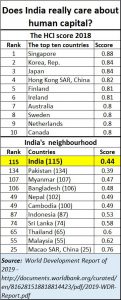https://www.freepressjournal.in/analysis/does-the-budget-not-care-for-human-capital/1453862
Interim Budget and its indifference to human capital
At a time when election fever is at its peak, it is not surprising to see the tide run out. That is when you embarrassingly discover who is swimming naked.
 In some ways the budget reveals a chink in the thinking of both legislators and the voting public. The focus has been on freebies, or what doles come your way, and even on grand illusions painted in the sky. Everyone seems to have forgotten that the real wealth of the nation is development of its human capital (http://www.asiaconverge.com/2018/10/poor-hci-rankings-and-a-soaring-stockmarket/).
In some ways the budget reveals a chink in the thinking of both legislators and the voting public. The focus has been on freebies, or what doles come your way, and even on grand illusions painted in the sky. Everyone seems to have forgotten that the real wealth of the nation is development of its human capital (http://www.asiaconverge.com/2018/10/poor-hci-rankings-and-a-soaring-stockmarket/).
The general public can be forgiven because it expects its leaders to think for them. But the leaders – both the elected ones, and even the ones who want to be elected – must be held accountable. After all, they are supposed to be law-makers and architects of a new India. But they too want freebies.
Look at the current budget too. It doesn’t even talk about investments in education. You cannot have a resurgent India without investments in health and education.
True, the government has talked about creating two lakh additional seats in institutes of higher learning. But where is the money to come from, after all the doles have been given away?
In fact, even the little (declining levels of education to GDP), that is spent is used so unwisely, that the government itself had to admit in the Lok Sabha on 5 March 2018 (in reply to the Unstarred Question No. 1385), that the rate of unemployment among the educated was higher than among the poorly-educated. The quality of education is so poor that it leaves many of the students almost unemployable.
The government’s constant defence is that education is a state subject (http://www.asiaconverge.com/2018/05/india-literacy-levels-much-lower-than-reported/). But surely, the centre can make the allocation of funds subject to minimum qualifying standards! Similarly, income tax exemptions for educational institutes could be made subject to minimum outcome standards as well. The truth is that the centre has been as negligent, or collusive, as the states.
That could explain why, even almost a year after dissolving the Medical Council of India (MCI), there is no move to abolish the licence raj for medical colleges. Everybody know sthat there is a shortage of medical college seats. Just allow any private management to set up medical colleges, charge the fees it wants provided some (say 25%) are priced lower. But ensure that tax concessions and continuation of control over the medical college would be subject to global outcome guarantees. Errant managements, like non-performing assets must be transferred to the next most deserving management which has met the outcome guarantees.
You will suddenly have many more colleges coming up with better educational standards. Is the government’s unwillingness to delicence medical colleges have something to do with the amount of capitation fees managements of such institutes charge (and possible share with others)?
As a result, you have the much vaunted Aayushman Bharat scheme, the world’s largest health insrance programme, but without enough doctors (http://www.asiaconverge.com/2018/08/ayushman-bharat-and-healthcare/). When too much of money is splurged without creating enough people qualified to implement the programme, you promote corruption and a degradation of practices. The government’s solution of allowing homeopaths and ayurveds to practice allopathy just muddies the waters. It degrades standards on the one hand, and promotes a capitation fee for ayurved and homeopath institutes as well.
If short term courses aimed at converting homeopaths and ayurveds into alopaths were a great idea, why not apply them everywhere? You could have six-month courses for converting government clerks into IAS and IPS officers. Similarly, you could have six-month courses for coverting court clerks into judges.
Don’t blame the current government alone. This malaise has been promoted by successive governments. It is currently abetted by all political parties. Read the manifestoes of all parties. None has talked about taking away school management rights from promoters who do not ensure good outcomes for students. None talks about delicensing school education and higher education.
Instead, the government wants to make compulsory the registration of all hospitals with Ayushman Bharat. The schedule of charges are so horrendously low that many hospitals would have to shut down or offer shabby treatment (which in turn will mean greasing the palms of health inspectors). The contagion could spread to destroying medicare in much the same way the government has already crippled mass primary education.
It is not surprising, therefore, that India ranks very poorly on the Human Capital Index (http://www.asiaconverge.com/2018/10/poor-hci-rankings-and-a-soaring-stockmarket/) of the World Bank (see chart). In Asia, only one country does more poorly than India – that is Pakistan. What a consolation!
But then that is what happens when legislators forget to promote education and medicare. They are the bedrock of wealth generation.





































COMMENTS